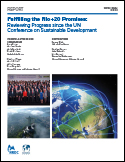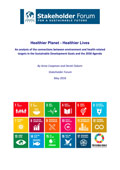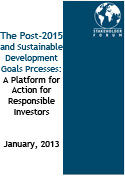Six Financial Tests for Sustainable Development Financing Success

The Sustainable Development Goals represent an ambitious attempt by the global community to establish a comprehensive set of universal medium and long-term goals for the whole world. They will require an equally ambitious plan to harness investment resources if they are to be achieved.
Public investment has an important part to play. But in a free market economy most investment decisions are ultimately taken by businesses and by the various private sector players in the financial and capital markets. Traditionally the overwhelmingly dominant objective criterion for those active in these markets has been the maximization of financial returns, with a strong preference for short term over longer-term returns, and no particular interest in the long term sustainability of the outcomes.
A framework therefore needs to be developed that will encourage all the players in the private sector investment markets from the final individual owners to individual businesses to operate in a more sustainable way, and to steer investment towards more sustainable businesses.
The SGDs underline the increasingly urgent need to plan for the long-term and tackle a range of environmental and social issues, including poverty, climate change and human rights.
The third International Conference on Financing for Development (FfD) ought to be the occasion for establishing this framework. But the present draft outcome document falls short in several crucial aspects. This note identifies six key areas on which more work is needed.
If the Sustainable Development Goals (SDGs) are to succeed, they must promote responsible stewardship. Furthermore, achievement of the SDGs will require the mobilisation of innovative sources of financing while also phasing out investment in unsustainable activities.
In other words, financial systems and capital markets are needed that address Environmental, Social and Corporate Governance (ESG) issues at every stage of intermediation. This involves ensuring that capital markets are comprised of intermediaries that embed ESG issues and long-term thinking throughout their operations and within their culture.
For policy-makers to achieve this transformation of the market they need to take a holistic, long-term and systemic view of the markets, and on the promotion of good standards, transparency, and appropriate incentive structures within these financial intermediaries. It also requires the correction of market failures that allow unsustainable companies to externalize costs onto societies and the environment, which weaken the long-term potential of the global economy.
Policy-makers need to promote good investment standards, and ensure that there is a chain of transparency and accountability connecting all the various stages of financial intermediaries with the individuals that invest at one end of the supply chain with the companies that they ultimately capitalize at the other.
At the moment, the supply chain of capital has both a significant number stages and a significant number of intermediaries. The operations of most of them are poorly understood due to a lack of transparency and poor financial and sustainability literacy among the end investors. Consequently, there is a lack of accountability, which results in unchecked, unsustainable outcomes.
To help ensure that the Outcome Document of the third International Conference on Financing for Development (FfD) is fit for purpose for financing the achievement of the SDGs specifically – and delivering sustainable development in general – we have developed Six Financial Fitness Tests.
Given below, we hope that these Six Tests can help to shape the future sustainable development financing agenda and act as an accountability tool to empower stakeholders in raising ambition and checking the suitability of the outcomes from the FfD Conference:
· Test 1. Getting Prices Right: Does the debate recognize the central importance of ensuring that the price mechanism promotes sustainable development in order to ensure that unsustainable business finds it hard to attract capital?
· Test 2. Getting Incentives Right: Are there measures that will change the business models and incentives of the institutional participants in the capital supply chain in particular, sell-side brokers, stock exchanges, fund managers, investment consultants and asset owners?
· Test 3. Securing Capital: Are there investment instruments that will be sufficiently attractive to markets and/or does it look likely to generate a plausible capital raising plan?
· Test 4. Systemic Transparency: Does the means of implementation include measures that will promote the transparency of companies on their sustainability performance as well as all the transparency of all the investment intermediaries that connect the end investor to the companies that they own?
· Test 5. Sustainable Finance Standards: Will the means of implementation create the right kind of hard and soft standards that facilitate sustainable capital markets? For example, will they ensure that Foreign Direct Investment by multinationals complies with generally accepted standards and norms, such as the UN Global Compact, the ILO tripartite Labour declaration, the Guiding Principles on Business and Human Rights and the OECD Guidelines for Multinational Enterprises? Will they place on investors in such businesses a responsibility for promoting such standards within the companies that they invest? Will they develop a responsible investment International Standard (ISO) for investment managers (including pension funds etc.) in order to ensure that their clients (the ultimate owners) can see quickly and easily whether their investment management firms are acting as good long-term owners?
· Test 6. Sustainable Demand for Sustainable Finance: Does the debate ensure that sufficient financial and sustainability literacy is developed amongst the investing public, amongst trustees of pension funds etc. and amongst financial intermediaries of all kinds to generate continuing market pressure for a steadily increasing proportion of all investment to be directed to sustainable outcomes?
We convert these Six Tests into an assessment framework by analysing the current state of the FfD negotiations and the latest negotiating document. The purpose of this exercise is two-fold:
1. Aid decision-makers in addressing gaps in the potential outcomes of the FfD conference – and ultimately the Post-2015 Development Agenda.
2. Provide an accountability tool for stakeholders to provide signposts for advocacy efforts.
Our assessment methodology uses a simple ‘RAG’ or traffic light rating system to provide a quick guide on where attention must be placed in order to secure an ambitious, progressive and transformative new Financing agenda which prioritises sustainable development and provide a framework for the reform our socio-economic systems. The assessment key is provided in Table A below, and the assessment itself is summarized in Table B below.
Table A – Six Financial Fitness Tests – Assessment Key
|
Rating |
Assessment |
|
|
Fail – The current negotiation document fails to achieve the Test in any way on any of the criteria within the Test. |
|
|
Partial success – The current negotiation goes some way in address the challenges of the Test, but more could be done against other criteria within the Test. |
|
|
Success – The current negotiation document address the Test well and provides outcomes which could result in the achievement of criteria within the Test. |
Table B – Six Financial Fitness Tests – Assessment
|
No |
Test |
Rating |
Commentary |
|
1 |
Getting Prices Right |
|
Fail – While the document does include useful suggestions on fiscal measures, particularly regarding the elimination of harmful subsidies for fossil fuels, it is not sufficiently central to the document. |
|
2 |
Getting Incentives Right |
|
Partial success – However, there needs to be far greater clarity regarding which incentives, which intermediaries and how this will be approached at the national level and internationally coordinated. |
|
3 |
Securing Capital |
|
Fail – There is no evidence that a capital raising plan will be generated, nor sufficient investable instruments created to finance the SDGs. This is a major problem with the current draft. |
|
4 |
Systemic Transparency |
|
Partial success – Excellent to see the proposal regarding Integrated Reporting becoming mandatory over the duration. However, more needs to be done to ensure systemic transparency, i.e. transparency by all the investment intermediaries including brokers, asset managers and asset owners etc. This latter element is entirely missing. |
|
5 |
Sustainable Finance Standards |
|
Partial success – However, very little of substance exists on the promotion of responsible investment standards. |
|
6 |
Sustainable Demand for Sustainable Finance |
|
Fail – There is nothing in the document that would help end investors to develop their capacity to exert increased and effective demand for sustainable and responsible investment by businesses and intermediaries of all kinds. This is a major missed opportunity. |
We hope that this simple summary assessment helps to make a complex, complicated and, at times, esoteric process more understandable. And, in turn, leads to better outcomes for both people and planet.
Of the Six Test, none could be consider ‘successfully’ achieved and three of the Tests were rated a ‘fail’.
In summary, our assessment determines that while there are some positive aspects stemming from the FfD negotiations thus far, there remains considerable work to be done if we hope to shift our financial systems and capital markets to a more sustainable footing and incentivise appropriate levels of financial investment to aid in the achievement of the SDGs.
We will continue to keep our assessment up to date as subsequent version of the potential FfD declaration are released. And after the conclusion of the FfD conference, we intend to use this assessment methodology to undertake a thorough post-mortem of the agreed outcomes to provide a ‘scorecard’ of the process and indicate areas and themes which require further work in other fora.
For further information, please contact:
Farooq Ullah
Stakeholder Forum



